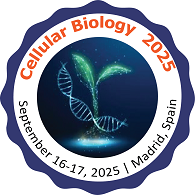About Conference
We welcome all the attendees to the 5th Experts Meeting on Plant, Cellular and Molecular Biology which will be held on September 16-17, 2025 in Madrid, Spain. Cellular Biology-2025 conference based on the theme “Plant Intelligence: Cellular Insights, Molecular Solutions”. Cellular Biology-2025 provides an exceptional opportunity for the participants or delegates with their relative backgrounds to share their research ideas and to learn from other colleagues and co-partners about the modern scientific improvements and innovation in the field of Plants and its research. Our main objective is to empower the appealing research field along with the need for commercialization by giving a chance to come across the specialists and Business entrepreneurs in the field of Plant Science.
Cellular biology 2025 offers you a notable space opportunity to present and evaluate the latest update with a complete approach to different areas of attention. Cellular biology is Interdisciplinary research, reaching from Agricultural Science to Paleobaotany and Molecular botany to Physiology.
Why Cellular biology -2025?
Cellular Biology – 2025 is a pioneering scientific event designed to bridge the gap between fundamental research and practical innovation across cellular biology and plant sciences. What sets this conference apart is its interdisciplinary focus, bringing together experts from diverse fields such as horticulture, agriculture, plant biotechnology, nanotechnology, forestry, and soil sciences to explore the most current and impactful developments in biological research.
This year’s edition introduces new and emerging topics, including advancements in plant nanotechnology, genetic engineering, cell signaling, plant-microbe interactions, and the application of artificial intelligence in cellular analysis. The event also highlights the role of regulatory frameworks in shaping the future of plant science and biotechnology, offering insights into policy trends and sustainable practices.
A distinctive feature of Cellular Biology – 2025 is its interactive and collaborative format, which includes hands-on workshops, panel discussions, poster sessions, and live demonstrations. Attendees will benefit from the opportunity to engage directly with top scientists, industry leaders, and academic pioneers, making it an ideal venue for networking, partnerships, and knowledge exchange.
Moreover, the conference serves as a Launchpad for innovative technologies, enabling researchers and companies to showcase their latest breakthroughs to a global audience. With its unique blend of academic excellence, real-world applications, and forward-thinking perspectives, Cellular Biology – 2025 is a must-attend event for anyone passionate about advancing the future of plant and cellular research.
Target audiences:
-
CEOs and Directors of research-based companies
-
Manufacturers of agricultural devices
-
Plant scientists and researchers
-
Botanists and paleobotanists
-
R&D organizations focused on agriculture and life sciences
-
Agricultural and plant science associations and societies
-
Experts in medicinal and aromatic plant science
-
Agribusiness entrepreneurs and startups
-
Professionals in horticulture and landscaping
-
Biochemists and biotechnologists
-
Research scholars and PhD candidates
-
Technical personnel and chemical engineers
-
Professors, academic heads, and department chairs
-
Students in life sciences and plant-related disciplines
-
Emerging entrepreneurs and early-career researchers
-
Scientists affiliated with Cellular Biology-2025
-
Academicians in the fields of cellular biology and plant research
About Organizing
The world's leading expert in organizing academic, scientific, and business conferences, meetings, symposia, and exhibitions in various vertical and horizontal sectors, including medical, pharmacy, engineering, science, technology, and business to advance scientific research is Conference Series LLC Ltd. With the kind assistance and collaboration of our 30,000 editorial board members and more than 1,000 scientific societies, we annually host over 3,000 international events, including more than 1,000 conferences, symposia, and workshops throughout the United States, Europe, the Middle East, and Asia. The DOI generated by CROSSREF is included in special issues of our 700+ international open access journals that publish all conference proceedings.
Session and Tracks
1. Plant Sciences and Research
This track covers the broad field of plant science, including the study of plant life, evolution, morphology, and interactions with the environment. It explores how plants have influenced human history, from early herbalism to advanced research in botany. Topics focus on plant taxonomy, physiology, ecology, and applied fields such as horticulture and agronomy.
2. Plant Molecular Biology and Biochemistry
Here, the focus is on the molecular mechanisms within plants. Plant Molecular Biology studies how genetic information is expressed in plants, impacting their structure and function. Plant Biochemistry investigates the chemical processes plants use for growth, metabolism, and defense. Both fields contribute to agricultural innovation and pharmaceutical applications.
3. Plant Biotechnology
This session explores techniques in plant biotechnology to develop crops with improved traits like disease resistance, higher yield, or environmental adaptability. This track focuses on genetic modifications and biotechnological applications to address global food security and environmental sustainability.
4. Plant Nanotechnology
Phytotechnologies and nanotechnology applied to plant sciences (phytonanotechnology) have the potential to revolutionize agriculture. This includes the use of nanoparticles for controlled release of agrochemicals, disease resistance, and enhancing crop yield. However, safety and environmental concerns are also addressed.
5. Plant Disease and Bryology
This track covers plant diseases caused by pathogens fungi, bacteria and environmental stress, alongside Bryology, the study of non-vascular plants like mosses. Research in this area aids in disease management and understanding plant evolution from primitive forms.
6. Plant Pathology and Mycology
Here, plant diseases caused by pathogens like fungi are studied in detail, alongside Mycology, the study of fungi. Understanding how fungi affect plants helps in developing methods for disease prevention, pest control, and improving crop health.
7. Plant Hormones
Plant hormones (phytohormones) regulate plant growth and development. This session will focus on how hormones like Auxin, Cytokinin, and Gibberellin control various physiological processes like cell growth, flowering, and fruit ripening. The use of plant hormones in agriculture and pharmaceuticals will also be discussed.
8. Phytochemical Analysis
This track deals with the chemical compounds produced by plants and their applications in medicine and cosmetics. It includes studies of bioactive compounds that are used for therapeutic purposes, as well as the growing popularity of plant-based products in cosmetics due to their antimicrobial and antioxidant properties.
9. Plant Metabolic Engineering
This session focuses on manipulating plant metabolism through genetic engineering to enhance the production of valuable compounds, such as pharmaceuticals, biofuels, and other industrial chemicals. It’s a growing field that bridges biotechnology with commercial applications.
10. Plant Nutrition and Soil Science
This track explores plant nutrition and soil management to enhance crop yields and sustainability. Topics include nutrient dynamics, soil fertility, and sustainable agricultural practices aimed at reducing environmental impacts and improving soil health.
11. Plant Tissue Culture
Plant Tissue Culture covers techniques like micro propagation for cloning plants and conserving endangered species. This session also looks at the use of tissue culture in improving crop varieties with enhanced disease resistance and stress tolerance.
12. Plant Genetics and Genomics
This session covers the study of plant genetics and the mapping of plant genomes. Genomics helps in crop improvement by identifying genes related to disease resistance, growth, and yield. It also includes applications in biotechnology for genetically modified crops.
13. Bioinformatics in Plant Sciences
Bioinformatics tools are essential for managing and analyzing vast amounts of data from genome sequencing projects. This track focuses on the application of computational tools in plant biology, including genome annotation, gene expression analysis, and the improvement of crops through computational predictions. These sessions provide a comprehensive overview of plant science, covering both basic research and applied technologies that have the potential to revolutionize agriculture, medicine, and biotechnology.
14. Climate Change and Plant Adaptation
This track focuses on how plants adapt to changing climatic conditions, including altered temperatures, droughts, and extreme weather events. Topics include genetic adaptations, physiological responses to climate stress, and strategies for breeding climate-resilient crops. The role of plants in mitigating climate change, such as carbon sequestration, will also be explored.
15. Plant-Soil Interactions and Microbiomes
This session explores the complex relationship between plants and the soil microbiome. It covers how soil microbes influence plant health, nutrient uptake, and stress tolerance. Research in this area may reveal new strategies for improving soil health and sustainable agricultural practices through microbial interventions and the manipulation of plant-microbe interactions.
16. Synthetic Biology in Plant Science
This track highlights the emerging field of synthetic biology applied to plant systems. Topics include designing novel plant metabolic pathways, creating synthetic plant materials, and engineering plants to perform new functions such as biofuel production or environmental remediation. The potential and challenges of synthetic biology in agriculture and biotechnology will be discussed.
17. Plant Evolution and Phylogenetics
This session delves into the evolutionary history of plants, using phylogenetic techniques to understand plant diversification and the genetic relationships between plant species. Research in this track can provide insights into the origin of plant traits, the evolution of major plant groups, and the conservation of genetic diversity in plants.
18. Plant-based Medicine and Therapeutics
This track explores the therapeutic potential of plants for the treatment of diseases. Topics include the extraction, identification, and application of medicinal compounds derived from plants for pharmacological purposes. Researchers will also discuss the challenges and benefits of developing plant-based drugs, as well as their role in traditional and modern medicine.
19. Urban Agriculture and Vertical Farming
Urban agriculture and vertical farming are growing fields aimed at increasing food production in urban environments. This session will cover the latest innovations in plant cultivation within cities, including the use of hydroponics, aeroponics, and controlled-environment agriculture systems. The role of plant science in creating sustainable, local food sources will be emphasized.
20. Plant Cryobiology and Conservation
This track focuses on cryobiology, the study of freezing plants for long-term storage and conservation. Techniques like cryopreservation, seed banking, and genetic material preservation will be discussed as tools for conserving rare and endangered plant species. It also explores the broader role of cryobiology in plant breeding and biodiversity conservation.
21. Plant Pollination and Reproductive Biology
This session investigates the science of plant reproduction, particularly pollination mechanisms and their role in ensuring crop productivity and biodiversity. Topics include the biology of pollination, the impact of pollinator decline on plant populations, and innovative strategies to enhance pollination services for both wild and cultivated plants. These additional sessions would expand the conference’s scope, introducing interdisciplinary topics that combine ecology, biotechnology, agriculture, and environmental science. Together, they provide a more comprehensive and innovative view of the latest advancements and challenges in plant biology.
Market Analysis
The market analysis for Cellular Biology-2025 underscores the increasing global importance of plant, cellular, and molecular biology, particularly in light of technological advancements and growing investments in plant research. The conference, centered on the theme "Plant Intelligence: Cellular Insights, Molecular Solutions," aims to facilitate the exchange of innovative ideas and technologies. This includes advancements in plant biology, such as liquid transportation systems, and the application of cutting-edge techniques in cellular biology. According to reports from the International Energy Agency, global plant research capacity is expected to see significant growth, with the operating capacity for advanced plant research doubling from 2 billion liters to 4 billion liters between 2013 and 2025. Additionally, the market for plant research is projected to expand from 115 billion to 139 billion during the same period. The adoption of advanced cellular biology techniques has become a key driver in the industry, with over half of newly installed techniques falling under this category. This growth reflects the increasing demand for innovative solutions in agriculture, environmental conservation, and energy sectors, indicating that plant and cellular biology research is an evolving market with substantial opportunities for further development and investment. The event provides a platform for researchers, institutions, and industries to share insights, collaborate, and explore new ways to optimize plant systems and technologies, with a focus on sustainable and efficient solutions.
Why Madrid?
Madrid, the capital of Spain, is a vibrant and cosmopolitan city located in the heart of the Iberian Peninsula. It is the political, economic, and cultural center of the country, known for its historic architecture, world-class museums, and dynamic lifestyle. Iconic landmarks include the Royal Palace, Puerta del Sol, Plaza Mayor, and the renowned Prado, Reina Sofía, and Thyssen-Bornemisza museums, which house masterpieces by Spanish and international artists.
The city offers a mix of old-world charm and modern innovation, with bustling neighborhoods like Gran Vía, Malasaña, and Chueca reflecting Madrid’s diversity and energy. Madrid is also famous for its lively tapas bars, flamenco music, and deep-rooted football culture, being home to Real Madrid and Atlético Madrid. With its sunny climate, green spaces like El Retiro Park, and warm, welcoming locals, Madrid is both a thriving metropolis and a city full of soul.
























